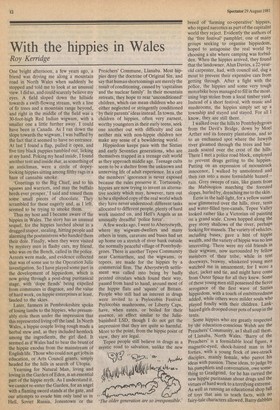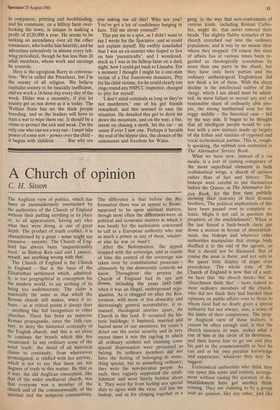With the hippies in Wales
Roy Kerridge
One bright afternoon, a few years ago, a friend was driving me along a mountain road in North Wales when suddenly he stopped and told me to look at an unusual view. I did so, and could scarcely believe my eyes. A field sloped down the hillside towards a swift-flowing stream, with a line of fir trees and a mountain range beyond, and right in the middle of the field was a 30-foot-high Red Indian wigwam, with a smaller one a little further away. I could have been in Canada. As I ran down the slope towards the wigwam, I was baffled by the fact that it seemed to have no entrance. At last I found a flap, pulled it open, and five tiny black puppies tumbled out, licking at my hand. Poking my head inside, I found another tent and inside that, as something of an anticlimax, were a circle of dopeylooking hippies sitting among filthy rags in a haze of cannabis smoke.
'Greetings to the Big Chief, and to his squaws and warriors, and may the buffalo herds ever prosper,' I said and tossed them some small pieces of chocolate. They scrambled for these eagerly and, as I left, seemed to be trying to smoke them.
Thus my host and I became aware of the hippies in Wales. The story has an unusual sequel, for the hippies lurched about in a drugged stupor, stealing, hitting people and alarming the postmistress who handed them their dole. Finally, when they were visited by mystery men in flashy cars, my friend, who was on the Bench, called in the police. Arrests were made, and evidence collected that was of some use to the Operation Julie investigation. So I have played some part in the development of hippiedom, which is now going through a post-drug puritanical stage, with 'dope fiends' being expelled from communes in disgrace, and the value of hard work, on hippie enterprises at least, lauded to the skies.
Later, farmers in Pembrokeshire spoke of losing lambs to the hippies, who presumably stole them under the impression that this represented living off the land. In North Wales, a hippie couple living rough made a herbal stew and, as they included hemlock among the ingredients, the girl died. It seemed as if Wales had to bear the brunt of the hippie exodus from the mainstream of English life. Those who could not get jobs in education, or Arts Council grants, simply headed for the hills in search of Utopia.
Yearning for Natural Man, living and loving in the Garden of Eden, is an essential part of the hippie myth. As I understand it, we cannot re-enter the Garden, for an angel with a flaming sword stands at the gate, and our attempts to evade him only land us in Hell, Soviet Russia, Jonestown or the Preachers' Commune, Llanaba. Most hippies deny the doctrine of Original Sin, and say that human shortcomings are merely the result of conditioning, caused by 'capitalism and the nuclear family'. In their mountain retreats, they hope to rear 'unconditioned' children, which can mean children who are either neglected or stringently conditioned by their parents' ideas instead. In towns, the children of hippies, often very earnest, worthy youngsters in their early teens, seek one another out with difficulty and can neither mix with non-hippie children nor make any sense of a bewildering world.
Hippiedom keeps pace with the Sixties and early Seventies generations, who are themselves trapped in a teenage cult world as they approach middle age. Teenage cults seem to be a shelter from the unknown and unnerving life of adult experience. In a cult the members' ignorance is never exposed because the rules preserve it. Tortuously, hippies are now trying to invent an alternative society which may, however, turn out to be a slipshod copy of the real world which they have never understood: different tasks allocated to different people, plenty of hard work insisted on, and Hell's Angels as an unusually dreadful 'police force'.
A few weeks ago, I went to Aberystwyth, where my wigwam-dwellers and many others in tents, caravans and buses had set up home on a stretch of river bank outside the normally peaceful village of Pontrhydygroes. There is another Tepee Community near Carmarthen, and the wigwams, or tepees, are made for the hippies by a commercial firm. The Aberystwyth settlement was called into being by badly printed circulars which found their way, passed from hand to hand, around most of the hippie flats and 'squats' of Britain. People who still had an interest in drugs were invited to a Psylocobin Festival. Psylocobin mushrooms, or Liberty Caps, have, when eaten, or boiled for their essence, an effect similar to the Juliebanished LSD, though I do not get the impression that they are quite so harmful. More to the point, from the hippie point of view, they are legal.
Tepee people still believe in drugs as a mystic road to salvation, unlike the new breed of 'farming co-operative' hippies, who regard narcotics as part of the capitalist world they reject. Evidently the authors of the 'free festival' pamphlet, one of many groups seeking to organise hippiedom, hoped to antagonise the real world by choosing a site where camping was forbidden. When the hippies arrived, they found that the landowner, Alun Davies, a 22-yearold carpenter, had, with council aid, dug a moat to prevent their expensive cars from getting through. After a fight with the police, the hippies and some very tough motorbike boys managed to fill in the moat, using logs stolen from a local timber yard. Instead of a short festival, with music and mushrooms, the hippies simply set up a township and stayed and stayed. For all I know, they are still there.
I walked over the hills to Pontrhydygroes from the Devil's Bridge, down by Moel Arther and its forestry plantations, and so to an enchanted spot where the Istwyth river gleamed through the trees and buzzards soared over the crest of the hills. There I met a police road block, employed to prevent drugs getting to the hippies. Putting on an expression of moonstruck innocence, I walked by unmolested and then ran into a more formidable hazard — rain. Grey sweeps of rain, like giants from the Mabinogion marching the forested slopes, hurled by, drenching me to the skin. Eerie in the half-light, for a yellow sunset now glimmered over the hills, river, tents and water-filled tyre-canals, Tepee Valley looked rather like a Victorian oil painting on a grand scale. Crows hopped along the grey stony shallows of the river, perhaps looking for mussels. The variety of vehicles, including buses, gave a hint of hippie wealth, and the variety of hippie was no less interesting. There were my old friends in their wigwam, now surrounded by fellow members of their tribe, while in tent doorways, brawny, whiskered young men watched me in amazement, for I wore a shirt, jacket and tie, and might have come from Outer Space for all they knew. Some of these young men still possessed the fierce arrogance of the first wave of Sixties hippiedom, with a touch of embitteredness added, while others were milder souls who played fondly with their children. Lank haired girls drooped over pots of soup in the tents.
Some hippies who are greatly respected by the education-conscious Welsh are the Preachers' Community, as I shall call them, of Llanaba, North Wales. 'Barry of the Preachers' is a formidable local figure, a magnetic-eyed, shock-haired man in his forties, with a young flock of awe-struck disciples, mainly female, who parrot his ideas with passion. These ideas, to judge by his pamphlets and conversation, owe something to Gradgrind, for he has carried the new hippie puritanism about drugs and the virtues of hard work to a terrifying extreme. As well as running an educational shop full of toys that aim to teach facts, with no fairy-tale characters allowed, Barry dabbles in computers, printing and bookbinding, and his commune, on a hilltop farm overlooking the town, is unique in making a profit of E120,000 a year. He seems to be seeking an ascendancy over all the other communes, who loathe him heartily, and he advertises extensively in almost every leftwing periodical, though he has less than 20 adult members, whose work and earnings he controls.
Here is the egregious Barry in conversation: 'We're called the Preachers, but I'm the enemy of all religion. We believe capitalist society to be basically inefficient, and we work a 16-hour day every day of the week. Hitler was a necessity, if you let society get as run down as it is today. The Welfare State has set the thick people breeding, and so the leaders will have to start a war to wipe them out. It should be a crime to protect the sick and weak. I'm the only one who can see a way out— I must take power of some sort — power over the child — it begins with children . . . . But why are you asking me all this? Who are you? You've got a lot of confidence barging in here. Tell me about yourself!'
This put me in a spot, as I didn't want to say I wrote for the Spectator, and so could not explain myself. He swiftly concluded that I was an ex-convict who hoped to live on him 'parasitically', and I wondered, stuck as I was in his hilltop farm on a dark night, how I could get back to Llanaba. For a moment I thought I might be a one-man victim of a Dai Jonestown massacre. Pity for his child victims, for he could clearly run rings round any NSPCC inspector, changed to pity for myself.
'I don't mind criminals as long as they're not murderers,' one of his girl friends remarked, and this seemed to ease the situation. He detailed this girl to drive me down the mountain, and on the way, a bat, intent on chasing a moth, hit the car — an omen if ever I saw one. Perhaps it heralds the end of the hippie idea, the closure of the communes and freedom for Wales.



































 Previous page
Previous page